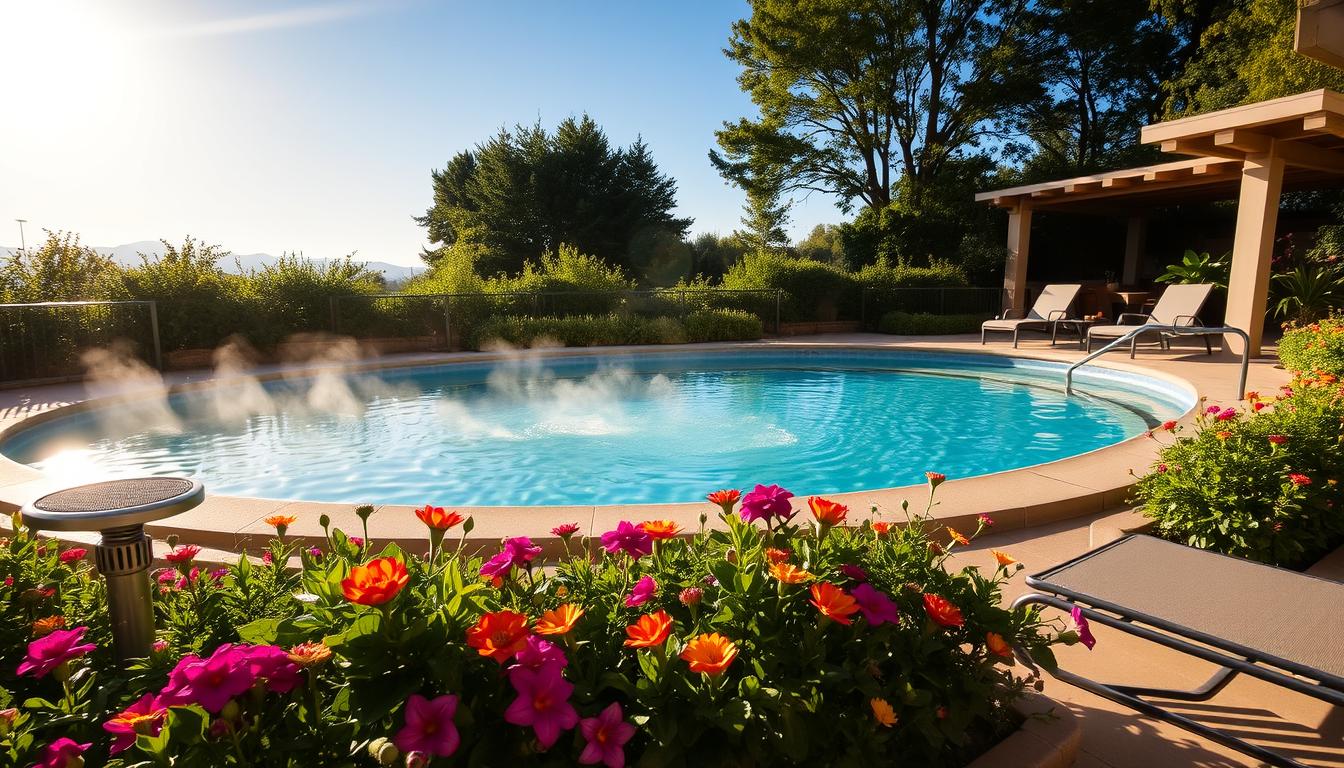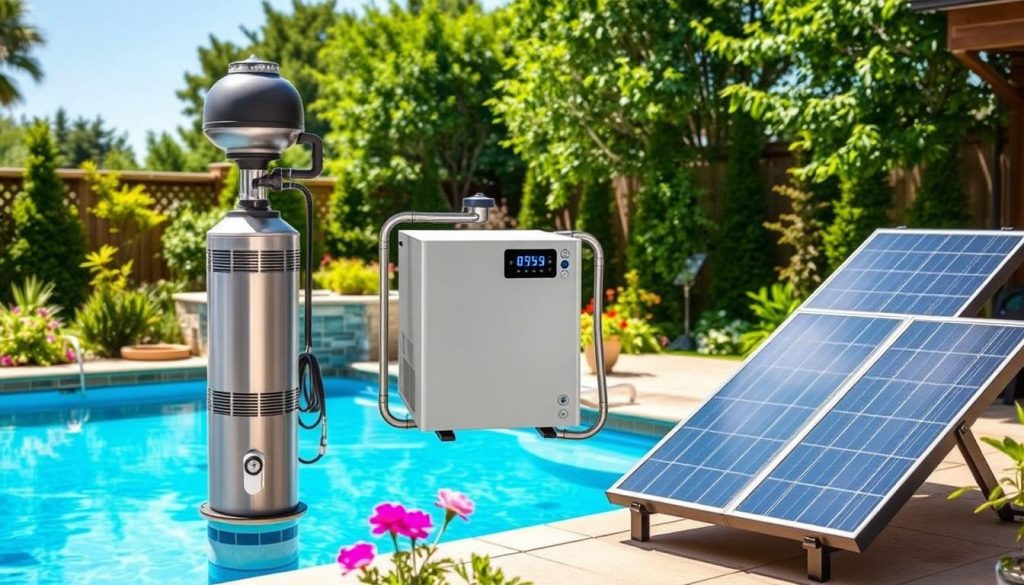
Summer’s coming, and we’re all excited to jump into our pools. But waiting for the water to warm up can be frustrating. How long does it take to heat a pool? Let’s explore this question together.
The answer varies based on several factors. With the right info and tools, you can speed up your pool heating time. This means you’ll be swimming sooner and more comfortably.
On average, heating a pool can take 8-48 hours. This raises the temperature by 10-20 degrees Fahrenheit. The time depends on your pool size and heating method.
For a 15,000-20,000 gallon pool in moderate weather, heating times differ. A gas heater might take 18-36 hours. An electric heat pump could need 36-48 hours.
Solar heaters are slower, typically requiring 48-72 hours. Understanding these factors helps you heat your pool efficiently. This saves energy and gets you swimming faster.
Factors That Influence Pool Heating Time
Several key factors affect how long it takes to heat your pool. Knowing these elements helps you make smart choices about your pool heating system. Let’s explore these factors to help you optimize your pool’s heating efficiency.
Pool Size and Volume
The size and volume of your pool greatly impact heating time. Larger pools need more energy and time to heat up. A small pool may take 24 to 72 hours to heat.
Medium-sized pools can take 48 to 96 hours. Large pools might need 72 to 120 hours to reach the desired temperature.
Starting Water Temperature
The initial water temperature plays a big role in heating time. Cooler starting temperatures require more time and energy to heat up. A larger gap between current and desired temperatures means longer heating times.
Desired Water Temperature
Your preferred swimming temperature affects heating time. Higher temperatures need more time and energy to achieve. Find a balance between comfort and energy efficiency when setting your desired temperature.
Heater Type and Efficiency
The type and efficiency of your pool heater influence heating time. Gas heaters are fast, often taking 8 to 12 hours. Electric heat pumps may need 12 to 24 hours or more.
Look for high Coefficient of Performance (COP) ratings in heat pumps. A higher COP means better efficiency and faster heating. Match your heater’s size and BTU output to your pool’s dimensions.
| Heater Type | Heating Time | Efficiency |
|---|---|---|
| Gas Heater | 8-12 hours | Fast but less efficient |
| Electric Heat Pump | 12-24 hours | Slower but more efficient (up to 600% COP) |
| Solar Heater | 24-48 hours or more | Eco-friendly but dependent on sunlight |
Weather Conditions and Climate
Environmental factors like air temperature, humidity, and wind affect pool heating time. Colder climates make your heater work harder and longer. Wind exposure can also lead to increased evaporation and heat loss, extending heating times.
Warm air and direct sunlight naturally warm the water, reducing heating time. Using a pool cover minimizes heat loss and evaporation, improving heating efficiency.
Proper insulation, such as pool wall and floor insulation along with a pool cover, can enhance heat retention and decrease heating periods.
Understanding these factors helps you optimize your pool heating setup. You can minimize heating time, improve energy efficiency, and enjoy comfortable swimming all season long.
Average Pool Heating Times by Heater Type
Pool heater choice affects how quickly your pool warms up. Let’s look at heating times for gas heaters, electric heat pumps, and solar heaters.

Gas Heaters
Gas pool heaters heat water fast, no matter the air temperature. They burn natural gas or propane to warm pool water. A gas heater can raise a 15,000-20,000 gallon pool’s temperature by 10-20°F in 18-36 hours.
Electric Heat Pumps
Electric heat pumps take heat from the air and transfer it to pool water. They’re slower than gas heaters but more energy-efficient. An electric heat pump needs 36-48 hours to warm a 15,000-20,000 gallon pool by 10-20°F.
Solar Heaters
Solar pool heaters use the sun’s energy to warm water. They’re eco-friendly, but depend on sunlight. In good conditions, a solar heater can raise a pool’s temperature by 10-20°F in 48-72 hours.
Weather and solar panel efficiency can affect heating times. These heaters work best with plenty of sunlight.
| Heater Type | Starting Temperature | Heating Time |
|---|---|---|
| Gas Heater | 50°F | 18-36 hours |
| Electric Heat Pump | 50°F | 36-48 hours |
| Solar Heater | 50°F | 48-72 hours |
These are average heating times. Actual results may vary based on pool size and local climate. Use a high-quality pool cover to keep heat in and maintain your desired temperature.
Tips for Faster and More Efficient Pool Heating
Upgrade to a higher BTU rated heater for faster pool heating. A more powerful heater can heat your pool water quicker and more effectively. Invest in a thermal pool cover to save energy and minimize heat loss.
These covers trap heat from the sun during the day and retain it overnight. This helps maintain a consistent water temperature. Install windbreaks like fences or hedges around the pool area to reduce heat loss.
Program your pool’s heating system to operate during peak usage times. This can result in energy savings. Maintain your heater on a set schedule to ensure a more efficient heating process.
Use a smart pool management system for better control over your pool heating. This allows you to schedule heating during off-peak hours or optimal sun exposure times. Regular maintenance, like cleaning pool filters, can optimize flow and save energy.
Start heating your pool well in advance of when you plan to use it. This ensures a comfortable swimming experience. By following these tips, you can heat your pool faster and more efficiently.







